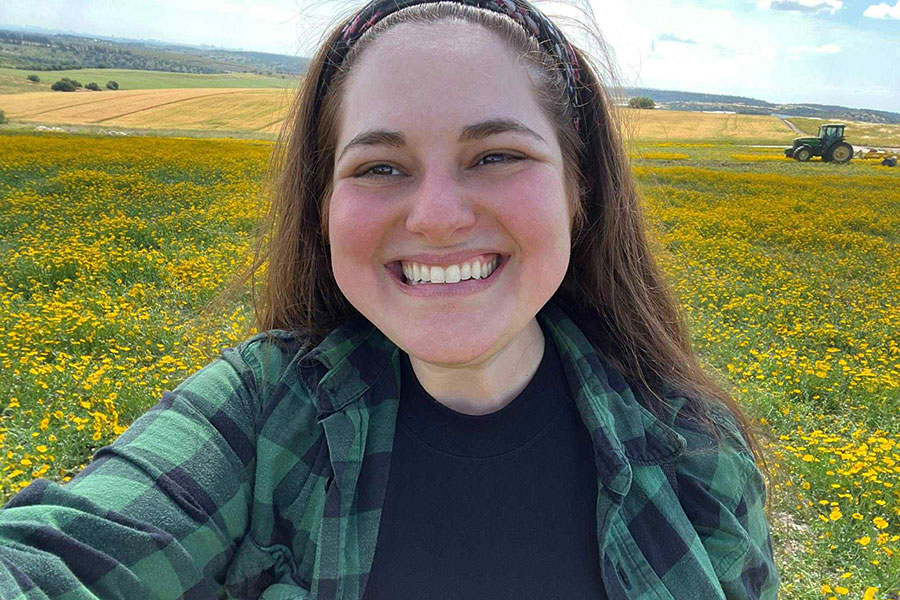
Historians, tasked with piecing the past together, often cross countries and oceans to access sources and better understand their topics of research.
For Danielle Wirsansky, a doctoral student in the Department of History at Florida State University, this meant traveling to Israel to trace the experiences of female agents of Britain’s Special Operations Executive (SOE), an intelligence organization during World War II, through the Fulbright U.S. Student Program.
“I can’t speak enough about how impactful it is for my research to actually travel and go to an archive in the country that you’re studying,” she said. “This is really a once-in-a-lifetime opportunity.”
The Fulbright Program is the flagship international educational exchange program sponsored by the U.S. government and is designed to increase mutual understanding between U.S. citizens and people of other countries.
Fulbright U.S. Student Program grant recipients are selected based on academic or professional merit and demonstrated leadership potential in their fields, with the program operating in over 160 countries worldwide.
The primary source of funding is an annual appropriation made by Congress to the U.S. Department of State Bureau of Educational and Cultural Affairs. Participating governments, host institutions, corporations and foundations also provide support.
Wirsansky initially became interested in a Fulbright fellowship after witnessing its lasting impact on the career of her doctoral adviser, Department of History Professor Emeritus Nathan Stoltzfus. Stoltzfus, formerly the Dorothy and Jonathan Rintels Professor of Holocaust Studies who taught at FSU for nearly 30 years before retiring in 2024, conducted research in Germany in 1984 through the Fulbright U.S. Student Program and still works with the same material from his own fellowship.
“It was really incredible to see the longevity and effect a Fulbright award could have, and that it’s still the basis of the research and the career he’s built thirty-plus years on,” Wirsansky said.
Wirsansky already has undergraduate and master’s degrees from FSU. She first connected with Stoltzfus — and history — through the Undergraduate Research Opportunity Program (UROP).
Pursuing degrees in creative writing and theatre, she had trouble finding arts-related UROP projects and decided to join Stoltzfus’ research on the Rosenstrasse Protest, which took place between February 27 and March 6, 1943, when approximately 200 non-Jewish German women held a non-violent protest in freezing conditions outside the Rosenstrasse detention center in Berlin, demanding the release of their Jewish family members (mainly husbands) who they feared were about to be deported to concentration camps.
Continuing to work with Stoltzfus, Wirsansky wrote a play with musical accompaniment about the Holocaust for her Honors in the Major project. She then applied for her master’s in history at FSU to establish her credentials as a historical playwright. Falling in love with research and writing along the way, she stayed for her doctoral degree to hone in on the topics of her master’s thesis, which analyzed the evolution of women’s roles in British society through the lens of female spies.
Eager to follow in the footsteps of her adviser and establish a similar foundation in historical research, Wirsansky started preparing her Fulbright application as soon as she began her doctoral program.
She wanted to travel to Jerusalem, Israel, to piece together the lives of female agents in the SOE, a British intelligence agency formed in 1940 to conduct espionage, sabotage and reconnaissance in German-occupied Europe during World War II. Specifically, Wirsansky’s project focuses on the opportunity to research the experience of agents who were captured and then placed into concentration camps.
In Jerusalem, Wirsansky had special access to materials in the Yad Vashem Museum, Israel’s official memorial institution to the victims of the Holocaust.
“This is one of the few places where I’m able to actually access deeper information for my research, so it’s been incredible to finally get my hands on these resources,” she said. “It’s going to make my dissertation so much more rich, evocative and meaningful than it would have been if I didn’t receive this opportunity.”
This direct immersion has not only expanded the breadth and depth of Wirsansky’s academic research but provided material for her more creative career goals.
“I feel like I’m set on research topics and things to write about for the next decade,” she said. “Even though I’m still very excited for my dissertation, I’m almost even more excited for all the projects and research that I’ll get to work on after that have come from this research trip.”
As a creative academic, Wirsansky enjoys combining her passions for research and writing to share these stories with wider audiences. She simultaneously serves as the playwright, founder, and finance director of White Mouse Productions, a Tallahassee-based theatre company.
“My playwriting work and my academic work overlap a lot,” she said. “Usually, I’ll find a person, place or event that I think is so interesting, that it’s not enough to write about them in just one field.”
These aspirations led Wirsansky to compose a large collection of short plays about the female SOE agents she studies in her dissertation.
“[Holocaust education] is not always about places, people and facts — it’s also about the aspects of humanity that we can gain,” Wirsansky said.
After completing her fellowship and doctorate, she plans to continue researching, teaching and writing about history.
“What really feeds my soul is the research and the writing,” said Wirsansky, who credits the Office of Graduate Fellowships and Awards for connecting her with the resources to nurture these passions. “If you’re aware of all the resources FSU has to offer, you can really make any research dream come true. Half of the battle is just applying. You’d be surprised that that’s all it takes.”
Interested in applying for a Fulbright?
Graduate students: Contact Keith McCall, assistant director of the FSU Office of Graduate Fellowships and Awards, at kmccall2@fsu.edu.
Undergraduates: Contact Bonnie Garcia-Gloeckner, assistant director of the FSU Office of National Fellowships, at bjgarcia@fsu.edu.
Faculty: Contact Peggy Wright-Cleveland, director of FSU Faculty Development, at mwrightc@fsu.edu.





